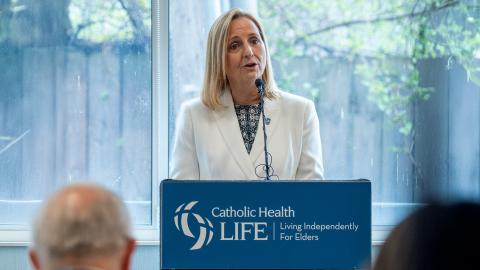
President Moves D'Youville to 32 Hour Work Week

President Moves D’Youville College to 32-Hour Work Week
Buffalo, New York – January 12th, 2022 – On Wednesday, January 5, D’Youville College held an all staff meeting to clarify employee questions and kick off their policy shift to a 32-hour work week.
Moving toward the post-COVID era of flexible work, D’Youville has taken a different approach from the many colleges and universities offering work-from-home options, and more simply, adjusted the employee work week to be four eight-hour days without changing their pay or benefits – similar to the Thirty-Two Hour Workweek Act proposed by Rep. Mark Takano (D-Calif.) and under review in Congress. Employees were previously working five 7.5-hour days – totaling 37.5 hours per week.
“The world of work has changed, and we cannot go back,” said D’Youville President Lorrie A. Clemo, PhD. “This is a multifaceted employee health and wellness initiative which we believe will ultimately benefit our students, employees, the institution, and our community.”
The program will offer students uninterrupted services with expanded hours of operation, opportunities to interact with individuals cross-trained to have broader skillsets, as well as a campus community of people that are simply happier. Employees will enjoy a consolidated work week which rewards technology efficiencies, reduces shared office density, and supports individuals’ pursuit of outside-of-work passions. Meanwhile, the institution is propelled forward with a commitment to upskilling and cross-training, environmental sustainability by reducing commutes, reducing parking congestion, reducing employee attrition, and supporting talent acquisition.
“This shift is propelled by technology and requires departments to move the dial on technology acceptance, professional development, and workflow optimization in order to remain eligible for the reduced work week hours. While it may seem novel, it actually just aligns our organization to the average annual hours currently worked by European Union countries,” stated Clemo.
The major principles of the program were described as:
1. Quality-
As a brick-and-mortar institution, employees will need to be cross-trained and schedules need to be organized in ways that “keep the lights on” for an expanded set of hours on the normal five-day work schedule.
2. Equity-
Employees will have an equal opportunity to schedule days off.
3. Efficiency-
Employees will need to identify and describe the workflow improvements that will be enacted which allows current workload to be managed.
4. Training-
Employees will be required to enroll in mandatory training programs and need to complete
modules on an agreed-upon schedule in order to remain eligible for the benefit.
5. Outcomes-
All offices/departments will develop plans designed to address key performance indicators (KPIs) which measure the outcomes of their operations.
6. Transparency-
All offices/departments will be required to establish a technological ticket system to queue, manage, assign, and report out of workflows in order to remain eligible for the benefit.
In regard to training, employees are being offered a first round of training in collaborative
functions of Microsoft Office365 or in Google Certificates for Project Management
and Data Analytics with American Council on Education (ACE) approved college credits.
A committee is being formed to continuously review and approve the next series of
continuing professional development programs that can help employees grow, while also
improving organizational outcomes.
“We will be learning, and growing, and getting better together,” said Clemo. “At the
end of the day, I’m very optimistic about how this wonderful benefit can serve as
the catalyst to achieve long-desired optimizations within higher education which in
the long-run will allow us to improve services while managing our costs.”
Clemo continued, “We are starting with a six-month trial period, however, I’m confident the policy shift is going to improve the overall wellbeing of our employees and competitiveness of our institution.”
See what Inside Higher Ed said about our plan


